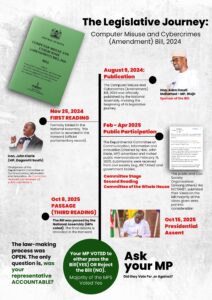Legislative Process Behind the New Law Allowing Govt to Regulate Social Media and Block Websites
Share
Kenya’s legislative process, often criticized for opacity and political influence, was on full display through the passage of the Computer Misuse and Cybercrimes (Amendment) Bill, 2024, a legislation that stirred national debate on free speech, digital safety, and government accountability.
According to official records and a timeline shared by Parliament, the Bill’s journey began on August 9, 2024, when it was officially published by the National Assembly, marking the start of its legislative life.
The Bill was sponsored by Aden Daudi Mohamed, Member of Parliament for Wajir, and sought to amend sections of the existing 2018 Cybercrimes law to address new challenges in the digital age.
From Publication to First Reading
Once published, the Bill was scheduled for its First Reading on November 25, 2024.
This marked its formal introduction in the National Assembly, where the proposal was recorded in the official parliamentary record, the Hansard.
At this stage, the Bill’s sponsor outlined its objectives, after which it was committed to the Departmental Committee on Communication, Information and Innovation, chaired by Hon. John Kiarie (MP, Dagoretti South).
The committee’s task was to receive, review, and analyze public submissions on the Bill before presenting recommendations to the House.
Also Read: Obama Joins the World in Mourning Raila Odinga
Public Participation and Committee Work
In accordance with Article 118 of Kenya’s Constitution, the process moved into the public participation phase between February and April 2025.
During this period, Hon. Kiarie’s committee invited written memoranda and oral presentations from citizens, civil society organizations, and professional bodies.
Among those who submitted their views was KICTANet, a digital policy network that has often participated in legislative reviews concerning internet regulation and privacy.
Civil society groups urged Parliament to safeguard online freedoms while addressing cyber threats.
The committee reviewed all the submissions and presented a report during the Second Reading, leading to clause-by-clause consideration during the Committee of the Whole House.
These deliberations allowed MPs to debate and propose amendments before moving to the next stage.
Third Reading and Passage
The Bill reached the Third Reading on October 8, 2025, when members of the National Assembly voted on whether to pass or reject it.
The majority of MPs voted “Yes”, formally adopting the proposed amendments.
The parliamentary infographic emphasized transparency, stating, “The law-making process was open. The only question is, was your representative accountable?”
Citizens were encouraged to ask their MPs whether they voted for or against the Bill, reinforcing the democratic principle of accountability.
Also Read: Babu Owino Reveals Plot to Attack Him Before Raila Odinga’s Burial
Presidential Assent
Following parliamentary approval, the Bill was forwarded to the President for assent.
On October 15, 2025, the President signed it into law, an act that sparked widespread debate due to its timing and content.
Critics argue that while the legislative process followed due procedure, the underlying motivations behind the amendments remain questionable.
Follow our WhatsApp Channel and WhatsApp Community for instant news updates

Kenya’s legislative process for the Computer Misuse and Cybercrimes (Amendment) Bill, 2024. PHOTO/ Parliament of Kenya.
You Might also Like







